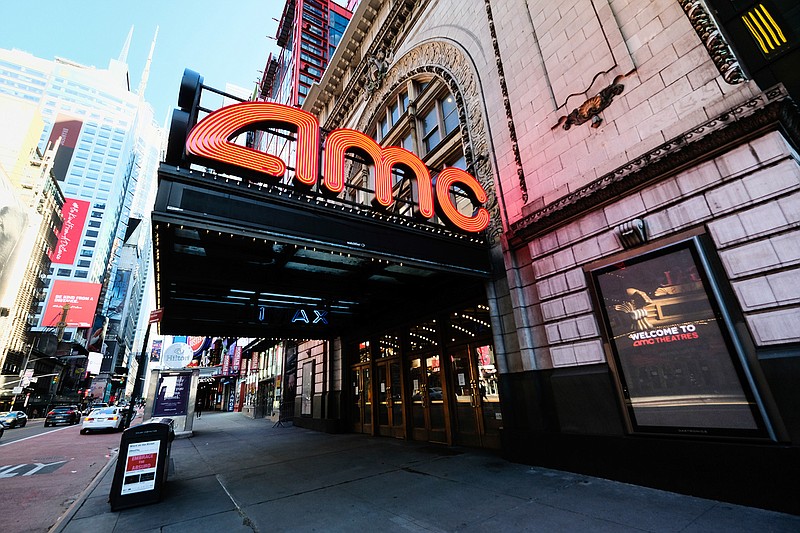NEW YORK - Movie theaters in New York state can reopen beginning Oct. 23 with restrictions on audience size and other precautions in place, Gov. Andrew Cuomo said Saturday.
Theaters in New York City aren't included, and counties must have a positivity rate below 2% on a 14-day average and have no "cluster zones."
Audiences will be restricted to 25% of capacity with a maximum of 50 people per screen, Cuomo said at his briefing. Masks will be required and there will be assigned seating to ensure social distancing.
This week, the Global Cinema Federation sent an open letter to Cuomo urging him to let theaters reopen, saying Hollywood studios may continue delaying their remaining 2020 releases if theaters remain closed. The group asked Cuomo to adopt a county-by-county plan for theater openings based on virus data, similar what it said California Gov. Gavin Newsom has done.
School sued
State and county health officials filed a lawsuit Friday against an Orange County school that they said has remained open despite an order to close because of a spike in coronavirus cases.
The Times Herald-Record reports the suit filed in state Supreme Court in Goshen names the Bnei Yoel school in Kiryas Joel, an Orthodox Jewish community. Earlier this month, Orange County health officials ordered schools in the area to close for two weeks.
In the lawsuit, a deputy county health commissioner said he visited the school on two days recently and saw children not wearing masks and not observing social distancing.
A phone message was left Saturday with the village's administrator.
Cuomo reinstated restrictions this month on businesses, houses of worship and schools in and near areas where coronavirus cases are spiking.
The new rules, which include school and business shutdowns and limitations on gatherings, affect parts of Brooklyn and Queens in New York City, sections of Orange and Rockland counties outside the city, and an area within Binghamton in the Southern Tier.
Some Jewish leaders have called the measures "blatantly anti-Semitic" for targeting Orthodox communities. On Friday, in a case brought by the Roman Catholic Diocese of Brooklyn, a federal judge upheld Cuomo's order limiting worship to as few as 10 congregants in communities seeing spikes in coronavirus infections.
Judge refuses to block church restriction
A federal judge has refused to block Gov. Andrew Cuomo's order limiting worship to as few as 10 congregants in communities seeing spikes in coronavirus infections.
Ruling in a lawsuit brought by the Roman Catholic Diocese of Brooklyn, U.S. District Court Judge Nicholas Garaufis said in an order Friday that even though the rules harm religious groups, it is not in the public interest to block them if they are helping prevent a wave of new infections.
"In fact, if the court issues an injunction and the state is correct about the acuteness of the threat currently posed by hotspot neighborhoods, the result could be avoidable death on a massive scale like New Yorkers experienced in the spring," Garaufis wrote.
The ruling doesn't end the lawsuit, but denied the church's request for a temporary injunction.
Garaufis said it was conceivable the diocese could end up ultimately winning the case, but that the worst that could happen in the meantime to the diocese's churches is that 26 of them would have to curtail in-person ceremonies for several weeks.
"That is not meant, in any way, to downplay the seriousness of that constitutional harm," the judge said. But he said the potential to save lives outweighed the damage the church would suffer.
Cuomo on Oct. 6 announced that he was limiting attendance at houses of worship, closing schools and shuttering nonessential businesses in six parts of New York City, Binghamton and Rockland and Orange counties where COVID-19 infections have spiked.
Most of the affected areas are home to large communities of Orthodox Jews, which has prompted protests from Jewish leaders who say they are being unfairly targeted.
Garaufis wrote in his decision that it was clear the state's restrictions had been "guided by science, not a desire to target religious practice."
The Brooklyn diocese had argued that its congregations hadn't seen a big increase coronavirus cases, and that it had implemented successful social-distancing measures for religious services, including placing communion wafers in congregants' hands rather than on their tongues.
Despite that, the governor "continues to run roughshod over the diocese's right to worship, without any basis--not a rational one, not a narrowly tailored one, simply none," the church's lawyers said in court papers filed Friday.
Similar lawsuits have been filed by Jewish groups.
In their filings, state lawyers said that within the state's so-called "red zones," just under 5% of all people who took a COVID-19 test were testing positive, down from nearly 8% in late September. They said that shows the restrictions are working, but said things had not improved enough to lift restrictions.
State lawyers also noted that the rules let houses of worship remain open, while nonessential businesses in "red zone" areas were required to close entirely.
"This response respects the rights of worshipers while curtailing the spread of the virus and protecting the public health from this deadly disease," Assistant Attorney General Seth Farber said in a Friday filing.
The Cuomo administration hasn't said exactly when the restrictions might be lifted, but the initial plan was to have them in place for at least two weeks.
A group of priests and Orthodox congregants sued in a different federal court in June over Cuomo's previous limits on religious gatherings, and a judge ruled that New York can't have stricter limits for houses of worship than nonessential businesses.
The group is now in court arguing Cuomo's new cluster zone plan violates that court order. A federal judge Friday gave Cuomo and New York City until Oct. 20 to respond.

